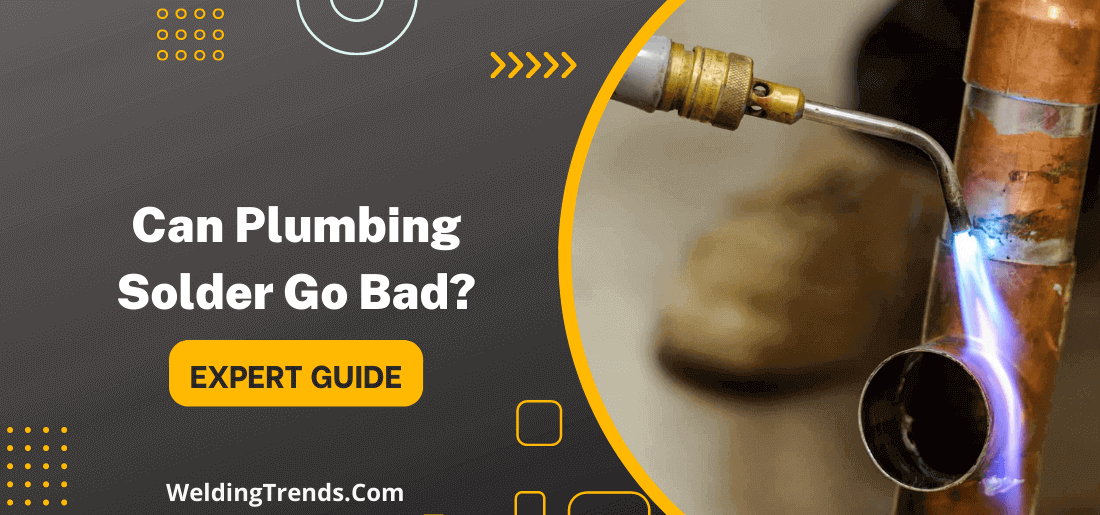We all know what plumbing solder is and how it’s used, but do we know what happens to it over time? Can plumbing solder go bad? Most people know that plumbing solder can go bad, but they may not know why or how to prevent it.
In this blog post, we will discuss the causes of solder failure and how to prevent it. We will also offer some tips for troubleshooting soldered joints that have already failed.
So, whether you are a beginner or a seasoned pro, read on for all you need to know about plumbing solder!
What is plumbing solder and what does it do?
Plumbing solder is an alloy of lead and tin that is used to join together two pieces of metal. The lead in the solder helps it to flow into the joint, while the tin provides a strong bond between the two pieces of metal.
When plumbing solder is heated, it melts and flows into the joint, where it cools and hardens, creating a strong bond between the two pieces of metal.
How to identify if your plumbing solder has gone bad?
There are many ways to find that your plumbing solders have gone bad which include:
- The most common symptom of bad solder is a joint that leaks.
- If the plumbing fitting is not leaking, but you can see that the solder has come undone, then it has probably gone bad.
- If the plumbing joint is old and has never been replaced, then it is likely that the solder has gone bad.
- If you have recently had flooding or fire in your home, then the solder may have gone bad due to exposure to water or heat.
If you suspect that your solder has gone bad, then you should replace it as soon as possible.
What are the consequences of using bad plumbing solder?
Following are the consequences of using bad plumbing solders are:
1. Poor Water Quality
Bad plumbing solder can cause a number of water quality issues, including lead contamination.
2. Pipe Corrosion
Another common issue associated with bad plumbing solder is pipe corrosion. This can occur when the solder used to join two pieces of metal piping contains impurities that react with the metal, causing it to corrode.
3. Leaks
One of the most serious consequences of using bad plumbing solder is the development of leaks. These can occur in both the joints between pieces of piping as well as in the actual pipes themselves.
In some cases, these leaks can be small and cause only a minimal amount of water damage. However, in other cases, they can be much larger and lead to serious flooding.
4. Health Risks
Finally, bad plumbing solder can also pose a number of health risks. This is because many of the impurities present in poorly-made solder can be harmful if ingested or inhaled.
In particular, lead is a common contaminant in bad plumbing solder that can cause several health problems, including neurological damage and developmental issues in young children.
5. Environmental Contamination
In addition to the health risks posed by bad plumbing solder, it can also lead to environmental contamination. This is because many of the same impurities present in the solder can also leach into the environment, where they can contaminate water supplies and soil.
How to fix bad plumbing solder?
If you have bad plumbing solder, the best thing to do is to replace it with new high-quality solder. This will help to prevent any of the above issues from occurring.
Additionally, if you suspect that your plumbing may be contaminated with lead or other impurities, you should have it tested by a professional. If the results come back positive, you may need to have your entire plumbing system replaced.
When it comes to your plumbing, it’s always better to err on the side of caution. This is why you should always use high-quality materials and hire a professional if you have any doubts. Doing so will help to ensure that your plumbing system stays in good condition for years to come.
Prevention tips to keep your plumbing solder in good condition
There are a few things you can do to help prevent bad plumbing solder from contaminating your home:
1. Use only lead-free solder
This is the most important step you can take to prevent contamination. Make sure to check the label of any solder you purchase to ensure that it does not contain lead.
2. Flush your pipes regularly
Flushing your pipes on a regular basis will help to remove any impurities that may have built up over time.
3. Have your plumbing system professionally inspected
Having a professional inspect your plumbing system for potential problems can help you catch issues early on before they have a chance to cause serious damage.
4. Use a water filter
Installing a water filter in your home can help to remove impurities from your water supply, making it safer to drink.
5. Educate yourself about the risks of lead exposure
The more you know about the dangers of lead exposure, the better equipped you’ll be to protect yourself and your family.
By following these tips, you can help to ensure that your plumbing system stays in good condition for years to come.
FAQs – Can plumbing solder go bad?
Does solder have a shelf life?
The answer is yes, solder has a shelf life. However, the length of time that solder can be stored before it begins to degrade will vary depending on the type of solder and the storage conditions.
For example, lead-based solders will begin to deteriorate more quickly than lead-free solders when exposed to oxygen and moisture.
Why is my solder not sticking to the pipe?
There are a few reasons why your solder may not be sticking to the pipe. The most common reason is that the pipe isn’t clean enough. Make sure you clean the area around the leak with a wire brush before soldering.
Another possibility is that the temperature of your iron isn’t hot enough. The solder won’t stick if the iron isn’t hot enough to melt it. If you’re still having trouble, try using a soldering paste. This is a special adhesive that can help the solder to stick to the pipe.
Once you’ve applied the solder, allow it to cool for a few minutes before turning on the water. This will give the soldering time to harden and create a watertight seal.
Are soldering pipes going to be illegal?
This is a difficult question to answer. While there are no current plans to make soldering pipes illegal, it is possible that new regulations could be put in place that would restrict or prohibit the practice.
If you are concerned about this issue, it is best to stay up-to-date on any new developments related to soldering pipes and other plumbing issues.
Conclusion:
Yes, plumbing solder can go bad. A solder that has been exposed to air and moisture will start to corrode and form a greenish-black film on the surface.
When solder goes bad, it can cause a number of problems in your plumbing system, including leaks and water damage. If you think your solder has gone bad, it’s best to call a professional plumber who can help troubleshoot the problem and fix it accordingly.




